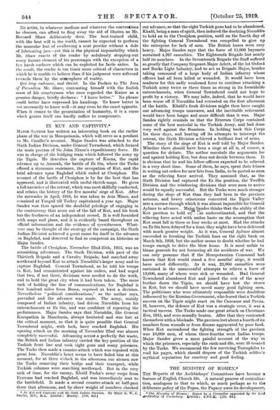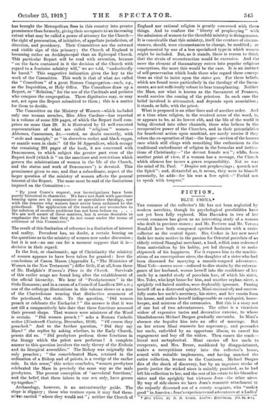THE 11IINISTRY OF WOMEN.*
T Reports of the Archbishops' Committees have beeome a feature of English Church life. A natural process of centralization, analogous to that to which, as much perhaps as to the deliberate policy of the Popes, the Papacy owes its development,
has brought the Metropolitan Sees in this country into greater prominence than formerly, giving their occupants to an increasing extent what may be called a power of attorney for the Church— the right of procuration, of initiative, of appellate jurisdiction, of direction, and presidency. Their Committees are the outward and visible sign of this primacy; the Church of England is becoming rather an Archiepiscopal than an Episcopal Church. This particular Report will be read with attention, because " on the facts contained in it the decision of the Church with regard to a feminine ministry will," we are told, "undoubtedly be based." This suggestive intimation gives the key to the work of the Committee. This work is that of what are called the " Consultors " of a great Roman Congregation—such, e.g., as the Inquisition, or Holy Office. The Consultors draw up a Report, or " Relation," for the use of the Cardinals and prelates who compose the congregation. These dignitaries may, or may not, act upon the Report submitted to them ; this is a matter for them to decide.
The Committee on the Ministry of Women—which included only one woman member, Miss Alice Gardner—has reported in a volume of some 320 pages, of which the Report itself comprises no more than 29. It is illustrated by 15 well-executed representations of what are called " religious " women—
Abbesses, Canonesses, &c.—vested, no doubt correctly, with " stole and maniple," or " in sleeveless rochet and black cappa, or mantle worn in choir." Of the 16 Appendices, which occupy the remaining 291 pages of the book, 8 are concerned with Deaconesses, to which subject the greater part even of the Report itself (which is " on the sanctions and restrictions which govern the ministrations of women in the life of the Church, and the status and work of Deaconesses") is devoted. This prominence given to one, and that a subordinate, aspect of the larger question of the ministry of women affects the general interest of the Report. The same must be said of the limitations imposed on the Committee : " By your Grace's request, our investigations have been purely historical in character. We have not dealt with questions bearing upon sex in comparative or speculative theology, nor with the reasons why women have never been ordained to the priesthood. The application of the results of our researches to the solution of modern problems has not been before us. . . . We are well aware of these matters, but it seems desirable to emphasize the fact that they do not come under the terms of reference of this Committee."
The result of this limitation of reference is a limitation of interest and reality. Precedent has, no doubt, a certain bearing on the questions as to the ministry of women now under discussion ; but it is not—no one can for a moment suppose that it is— decisive in their regard.
In the first, or charismatic, age of Christianity the ministry of women appears to have been taken for granted : here the conclusions of Canon Mason (Appendix I., "The Ministries of Women in the New Testament") differ little, if at all, from those of Mr. Hodgkin's Woman's Place in the Church. Survivals of this earlier usage are found long after the establishment of the official hierarchy. We hear of "Presbyteresses " in the Ordo Romanus; and in a canon of a Council of Laodicea 380 A.D. ; one of the collotype illustrations in this volume shows us a nun of the Charterhouse wearing that distinctive ornament of the priesthood, the stole. To the question, "Did women preach or celebrate the Eucharist ? " the answer is that it was not till a comparatively late date that these functions assumed their present shape. That women were ministers of the Word is certain. " Did women preach ? " asks a Roman Catholic writer (Nineteenth Century, December, 1916). " Of course they preached." And to the further question, " Did they say Mass? " she replies by asking whether, in the Early Church, priests did so. "Did presbyters perform those functions in the liturgy which the priest now performs ? A complete answer to this question involves the early theory of the Ecclesia and its liturgical assemblies." The Bishop was originally the only preacher ; " the concelebrated Mass, retained in the ordination of a Bishop and of priests, is a vestige of the earlier rule. In this sense," this writer concludes, "women presbyters celebrated the Mass in precisely the same way as the male presbyters. The present conception of sacerdotal functions,' and the belief that these inhere in one sex only, have grown up together."
Archaeology, however, is an untrustworthy guide. The slope is slippery ; those who venture upon it may find them se:ve3 carried " where they would not " ; neither the Church of England nor rational religion is greatly concerned with these things. And to confuse the "liberty of prophesying" with the admission of women to the threefold ministry is disingenuous. It is conceivable that this ministry, itself the creature of circumstances, should, were circumstances to change, be modified ; or supplemented by one of a less specialized type in which women might be included. But, as it stands, there is reason to think that the strain of reconstruction would be excessive. And the more the element of thaumaturgy enters into popular religious conceptions, the more this would be the case. It is an instinct of self-preservation which leads those who regard these conceptions as vital to insist upon the status quo. For these beliefs, which are found more particularly in the theology of the Sacraments, are not sufficiently robust to bear transplanting. Neither the Mass, nor what is known as the Sacrament of Penance, would survive the coming of the priestess. In each case the belief involved is attenuated, and depends upon association ; it stands, or falls, with the priest.
What is proposed is on other lines and of another order. And at a time when religion, in the received sense of the word, is, or appears to be, at its lowest ebb, and the life of the world is being diverted into other channels, those who believe in the recuperative power of the Churches, and in their potentialities for beneficent action upon mankind, are surely unwise if they refuse the co-operation of that—the larger—section of the human race which still clings with something like enthusiasm to the traditional embodiment of religion in the formulas and institutions of Christianity—" the devout female sex " ; while, from another point of view, if a woman has a message, the Church which silences her incurs a grave responsibility. Not so was the mind of St. Paul. " Despise not prophesyings ; quench not the Spirit": and, distasteful as, it seems, they were to himself personally, he adds—for his was a free spirit—" Forbid not to speak with tongues."











































 Previous page
Previous page